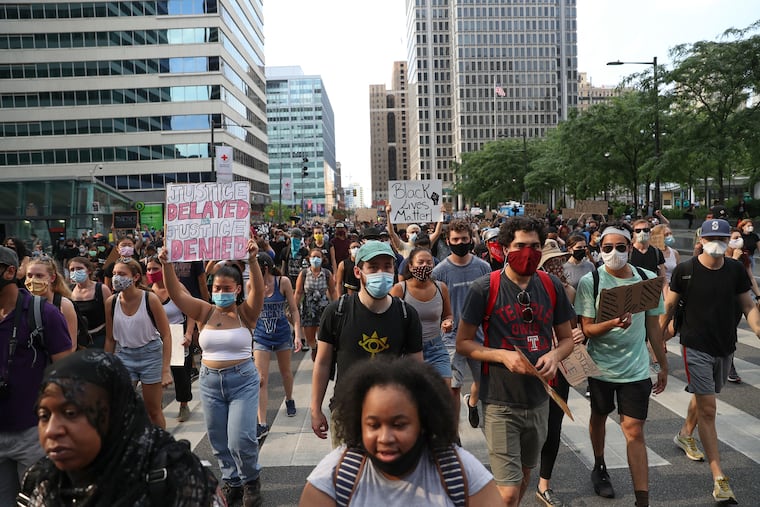Even in this time of protest and unrest, wearing masks is essential | Expert Opinion
Even as we support protests against racism, we can’t help but worry that large crowds in Philadelphia and other cities might spark a second wave of COVID-19 infections and all our efforts may be in vain.

We all want this to be over. We are fatigued from quarantine, upset by injustice, and overwhelmed by this moment in our history, yet we are still concerned about COVID-19. Stay-at-home orders may be successfully curbing the virus, but that doesn’t make it feel any less oppressive. As doctors, we understand why some people have given up on following the rules and stopped wearing masks and social distancing. We are tired of having our freedoms shackled. Simple visits with family and friends seem like relics of the past. Even the loss of non-essential activities like haircuts, manicures, going out to movie theaters, restaurants, gyms, setting playdates for kids, has left us wondering, “Is this ever going to be over?”
Like everybody else, we want to get back to our normal lives. But as doctors, we also realize that you can’t quit while you’re ahead. And it remains to be seen if we are indeed ahead.
American physicians have been working harder than ever tending to patients on the frontlines, while also facing exposure to the virus. Some have been re-deployed from other specialties. They are wearing the same N-95 masks, intended for single use, for consecutive shifts and longer. Then, when these doctors return home, they cannot even think about embracing their families.
This is not paranoia. At least 100,000 people have died from COVID-19 in recent months in the United States.
Now, as the crisis wears on, when we walk by block parties or parks full of people, as physicians, we can’t help but feel defeated. Was the work and sacrifice of these health care workers for nothing? Even as we support protests against racism, we can’t help but worry that large crowds in Philadelphia and other cities might spark a second wave of COVID-19 infections and all our efforts may be in vain. We must find ways to demonstrate and let our voices be heard while still adhering to social distancing.
How can we improve mask compliance? One solution is “mask mandatory” policies. Anyone over age 2 who is medically able to wear a facial covering when in an enclosed space should be required to do so. Anyone unable to wear a mask should stay home. No exceptions. Like wearing a seatbelt, which unlike masks only protects the wearer, it should be the law.
We acknowledge that masks are difficult to wear: they’re uncomfortable, they make it hard to breath and talk, they can cause skin irritation, and it’s unnatural not to see each other’s faces. Yet we must endure this discomfort and inconvenience to get through this, together.
» READ MORE: From Thursday: A sixth day of protests and curfews
Some argue they have freedom to not wear a mask. But freedoms are not absolute. Consider Supreme Court justice Oliver Wendell Holmes’ limitation to freedom of speech: “Falsely shouting fire in a theatre and causing a panic." Likewise, not wearing a mask both ignores the science and imposes danger on the public. Wearing a mask protects others. If you have your mask off for a few minutes while talking close to a friend, you can spread the virus to them, and you may not even know it, since asymptomatic people can spread the virus.
If you’re out, marching in protest, or just shopping, please wear a mask and protect the most vulnerable, such as the elderly and those with compromised immune systems. But even children, who seemed protected from COVID-19, may be at risk for other problems from the virus, such as the increasingly reported Kawasaki-like syndrome. Your mask should cover both your nose and your mouth, don’t let it slip down or hang around your neck.
Though mandatory mask policies are difficult to enforce, and efforts to educate the public may not prove effective, for those of us who can, let’s do our part and not be discouraged. We know it’s not easy, but we are with you and applaud every one of you who wear your mask.
Malini Gupta is an endocrinologist and director of G2Endo in Memphis, Tenn. Azmatullah Hussaini is a hospitalist at Virtua Health and president of the American Muslim Health Professionals, New York/ New Jersey chapter. Jules Lipoff is an assistant professor of dermatology at the University of Pennsylvania Perelman School of Medicine.